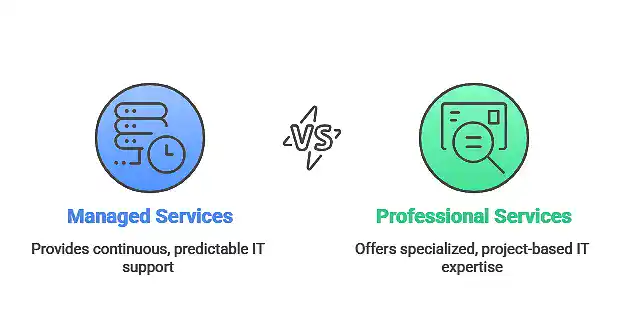Technology is at the center of growth today. Yet many SMBs struggle to manage it well. According to ESG Research, 77% of organizations say their IT infrastructure complexity is increasing faster than their ability to manage it. This growing gap makes it harder for leaders to choose the right support model.
| As Paul Marchese, CEO of MCP, says, “The real question is not if you need IT help, but which type of help positions your business for growth.” |
This blog explores managed services vs professional services in detail. It will help you understand how each works, where each fits, and why the right choice matters for your business.
What Are Managed Services?
Managed services provide ongoing IT support through a long-term partnership. Instead of handling daily tech tasks in-house, businesses rely on a provider to monitor, manage, and maintain systems, ensuring security, uptime, and efficiency.
Around 46% of companies have adopted managed IT services. This model is ideal for organizations that want predictable costs, reduced risk, and expert oversight without expanding internal teams.
Key features of managed services:
- Predictable Costs: Subscription-based pricing helps avoid surprise expenses and simplifies budgeting.
- 24/7 Support: Round-the-clock monitoring and issue resolution minimize downtime and keep operations running smoothly.
- Proactive Monitoring: Providers detect and fix problems early across networks, applications, and endpoints, before they escalate.
- Cybersecurity & Compliance: Managed services include data protection, threat detection, and regulatory support to safeguard sensitive information.
- Infrastructure & Cloud Management: Providers optimize cloud environments and IT infrastructure for scalability, resilience, and performance.
Example Scenario of Working with a Managed Services Provider (MSP)
In a retail business, uptime during peak seasons is critical. Managed services ensure continuous monitoring and guaranteed availability, preventing costly disruptions and lost sales.
Managed services act as a strategic extension of your team, freeing internal resources to focus on innovation and growth. They’re especially valuable for businesses that lack the bandwidth to manage IT in-house but still need enterprise-grade reliability.
Get Long-Term Reliability and Expert Guidance in One Plan!Don’t sacrifice support for expertise. We help you design an IT roadmap that delivers both. |
What Are Professional Services?
Professional services are project-based engagements designed to solve specific challenges or implement new technologies. Unlike managed services, they don’t offer continuous support; once the project is complete, the engagement ends.
These services are ideal when you need expert execution without committing to long-term contracts.
Key features of professional services:
- Targeted Expertise: Providers offer deep knowledge to implement or optimize a specific technology, such as CRM, ERP, or cybersecurity tools.
- Defined Scope & Timeline: Projects come with clear deliverables, deadlines, and expectations, ensuring transparency and accountability.
- One-time Cost: You pay a fixed fee for the project, avoiding ongoing subscription costs typical of managed services.
- Knowledge Transfer: Your team is trained to manage the solution post-deployment, ensuring independence and continuity.
Example Use Case
If you’re migrating to a new CRM system, a professional services provider can handle setup, integration, and staff training, delivering a complete solution without ongoing support unless re-engaged.
Professional services offer precision, control, and flexibility, perfect for businesses that need expert help on demand without long-term commitments.
Managed Services Pros and Cons for Business Leaders
Managed services provide several advantages. Some of these benefits include:
- Predictable pricing through subscription models that simplify IT budgets.
- Increased reliability, as proactive monitoring reduces downtime and service interruptions.
- Enhanced cybersecurity by closing gaps and constantly monitoring for threats.
- Efficiency gains since your internal team can focus on strategic projects.
However, there are also challenges. Some executives feel a loss of control, as the provider often controls operational details. Vendor dependency is another issue if the contract locks you into long-term commitments.
For SMBs, these drawbacks often feel less critical compared to the cost of downtime. ITIC reports that the average cost of IT downtime is $300,000 per hour. With numbers like that, the reliability of managed services is often worth the trade-off in autonomy.
| Read More: |
Professional Services Pros and Cons for Business Leaders
Professional services also come with both strengths and weaknesses.
Benefits:
- Focused expertise for deploying or configuring complex systems correctly.
- Cost-effective solution for one-off projects without the long-term commitment.
- Knowledge transfer that equips your staff to manage technology in-house.
Challenges:
- No ongoing support once the project ends, which can leave you without help if issues arise later.
- Limited scope that does not cover broader IT operations.
Professional services are well-suited for businesses that already have a mature IT team. They are ideal when you need outside expertise for a specific project but still plan to manage the solution internally.
Comparing Managed Services vs Professional Services
The choice between managed services and professional services often comes down to scope, timeframe, and your internal capacity.
- Scope: Managed services cover general IT functions like security, compliance, and infrastructure. Professional services focus on specific projects such as migrations or integrations.
- Timeframe: Managed services are ongoing. Professional services are short-term with a clear beginning and end.
- Business Role: Managed services providers take over management. Professional services providers empower your team to run the solution afterward.
For example, if you run a healthcare practice, compliance and uptime are critical every day. Managed services would make sense because you need continuous monitoring.
On the other hand, if you are implementing a new ERP system, professional services are a better fit since the need is temporary and project-focused.
How Managed Services and Professional Services Work Together
It’s not always a matter of choosing one over the other. Managed and professional services often complement each other, and when used together, they deliver stronger, more sustainable outcomes.
For example, in a system integration project:
- Professional services handle the design and deployment
- Managed services take over post-launch, ensuring performance, security, and ongoing support
This combination improves ROI by pairing expert implementation with long-term optimization.
Benefits of combining both models:
- Expert Execution: Professional services deliver specialized, project-based expertise for complex deployments.
- Ongoing Support Managed services ensure systems stay secure, updated, and monitored after launch.
- Higher Efficiency: Organizations that combine both models see higher efficiency in IT operations.
- Scalable Strategy This hybrid approach adapts to evolving needs, supporting both short-term initiatives and long-term stability.
Together, these models create a seamless IT lifecycle, from planning and deployment to maintenance and growth.
Choosing the Right Approach for Your Organization
Your decision depends on your business goals, IT maturity, and budget. Managed services and professional services each deliver value, but in different ways.
Key factors to consider include:
- Budget: Managed services spread costs predictably over time, while professional services require upfront investment.
- IT Maturity: Companies with limited IT expertise often benefit from managed services, while experienced teams may prefer professional services for specific needs.
- Growth Goals: If your focus is rapid scaling, managed services ensure your IT keeps pace. If you want precise project support, professional services fit better.
- Compliance Needs: Businesses in regulated industries often find managed services helpful for continuous monitoring and reporting.
Think carefully about where you need ongoing support and where you need specialized expertise. In many cases, you will benefit from a combination.
Why Your IT Partner Matters
Choosing between managed services and professional services is important but the real difference lies in the provider.
A strong IT partner doesn’t just deliver support; they align technology with your business goals, protect your operations, and help you grow.
At MCP, we lead with a security-first mindset, backed by transparent pricing and proven results. In over 43 years, not a single managed services client has experienced a compromise. That kind of track record speaks volumes about trust and reliability.
Key reasons your IT partner choice matters:
- Strategic Fit Over Service Model: Whether managed or professional services, success depends on how well the provider understands and supports your business goals.
- Security-First Approach: Proven protection and proactive monitoring reduce risk. MCP’s zero-compromise record over four decades is a rare achievement.
- Transparent Pricing: Clear, predictable costs help you budget confidently and avoid hidden fees or surprise charges.
- Long-Term Value: A value-driven partner delivers more than tech; they become an extension of your team, supporting daily operations and strategic projects.
Pro Tip for Business Leaders
Choosing between managed services and professional services is rarely a one-or-the-other decision. The smartest approach is balance.
Managed services give your business stability, proactive monitoring, and long-term reliability. Professional services bring targeted expertise for defined projects and knowledge transfer to your internal team.
Together, they create a stronger framework that helps you achieve consistent performance while still advancing key initiatives.
In One Glance: Key Differences Between Managed Services and Professional Services
It is useful to have a quick reference when comparing the two models. The table below outlines where each model excels and how you can decide between them.
| Feature | Managed Services | Professional Services |
| Scope | Broad IT operations, including security, compliance, and monitoring | Project-specific, such as migration, integration, deployment |
| Timeframe | Ongoing subscription, continuous support | Defined start and end, one-time cost |
| Business Role | Provider manages and operates systems | Provider implements, then transfers knowledge |
| Cost Model | Predictable monthly pricing | Upfront project fee |
| Ideal Use Case | Businesses needing 24/7 support and compliance | Businesses needing expert help for one-time projects |
Grow Your Business Smarter With MCP’s IT Support Services
Choosing between managed services and professional services requires a careful look at your business needs. Both have unique benefits, and the strongest results often come from combining them.
MCP has been supporting businesses for more than 43 years. We currently manage over 5,000 endpoints with an average issue resolution time of less than 15 minutes. With our proven record of zero compromises for managed clients, we show what it means to deliver IT with security and reliability.
| Explore our range of managed IT services near you:
|
Contact us today for a free consultation and network scan. Let us design a technology strategy that gives your business stability and growth.









